The COVID-19 pandemic has imposed unprecedented circumstances on businesses to adapt to a new “normal.” And, with this, even IT businesses are under scrutiny for their agility to deliver software products and services. Hence, today the need of DevOps has become more prominent than ever and through this article, we aim to highlight specific benefits that can incentivize customers to migrate with DevOps in the cloud in their adoption journey. Of course, business value through cost-optimization tops the list.
DevOps has become a priority for enterprises to ensure business continuity. And, even though it has been a goal for many IT firms for years, today’s work-from-home reality has further reduced the timeline for DevOps adoption. Often the DevOps solution approach, by default, is developed for remote workspaces. It features automated software development methodology irrespective of whether the team is working remotely or on-premise.
But, what about enterprises that are just exploring DevOps or haven’t been down the DevOps road before?
Experienced DevOps service providers, like Rishabh Software, uniquely addresses the challenges of DevOps adoption by leveraging the benefits of DevOps and project customization for customers. It ensures a smooth organizational transition from traditional to cutting-edge through a turbulence-free cultural reboot.
Why all roads are leading to DevOps and Cloud computing
The rapidly expanding landscape of cloud computing services, automation, analytics, mobility, and more is potentially driving organizations to transform into digital enterprises to enhance productivity and profitability.
Entrepreneurs and C-level executives are increasingly adopting cloud services to reduce IT costs, break silos, and support the Internet of Things to automate traditional services that include,
- Creation of the infrastructure for development, testing and production, while configuring networks
- Harnessing security and data protection
- Setting up, configuring and deploying software
- Testing and validating information – Data generated from the application, exchanged between systems, and log data
- Supporting infrastructure and applications–Maintenance, upgrades and transitions
- Optimum market responsiveness through flexible IT environments in the desired budget
Benefits of DevOps in Cloud Computing
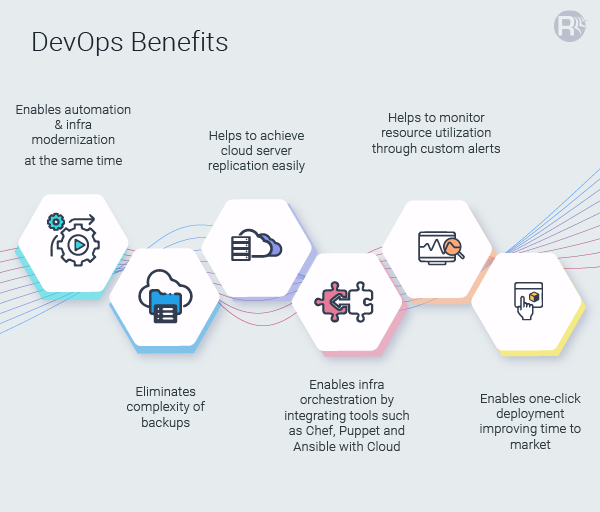
Leveraging Role-based Performance to Achieve High Enterprise Performance
The DevOps culture helps imbibe end-to-end processes of delivering business values. It is while ensuring that all core operations coherently deliver reliable business outcomes, optimize the cycle, and shorten the product time-to-market. Further, it also helps break the wall of confusion between roles that contribute significantly to the release, launch, and performance of a software product.
Do you experience slow project delivery or product quality compromise when your teams disagree with each other? Is this impacting team motivation? If yes, then DevOps is the answer to these worries. It creates better workflow transparency and team collaboration through a well-established CI/CD pipeline.
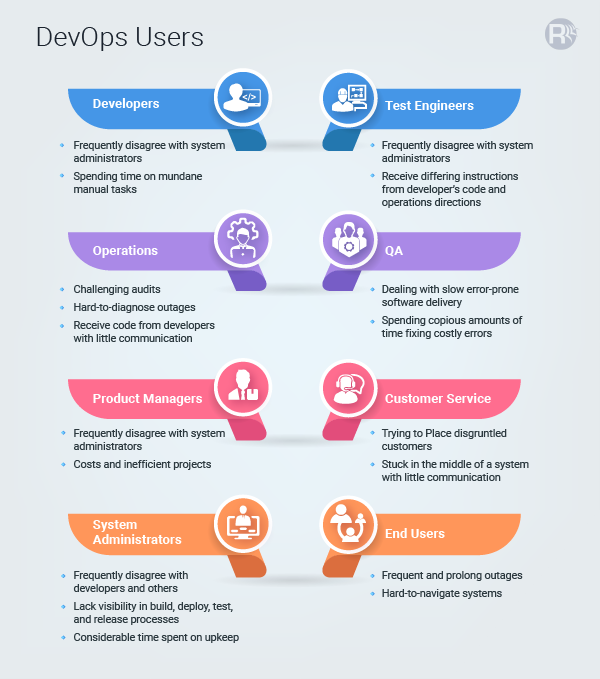
Say Hello to DevOps!
At its core, DevOps offers a close-knit alignment between business and IT Operations. It provides any business struggling to achieve faster delivery in an ever-changing IT business environment, higher efficiency and uncompromised quality.
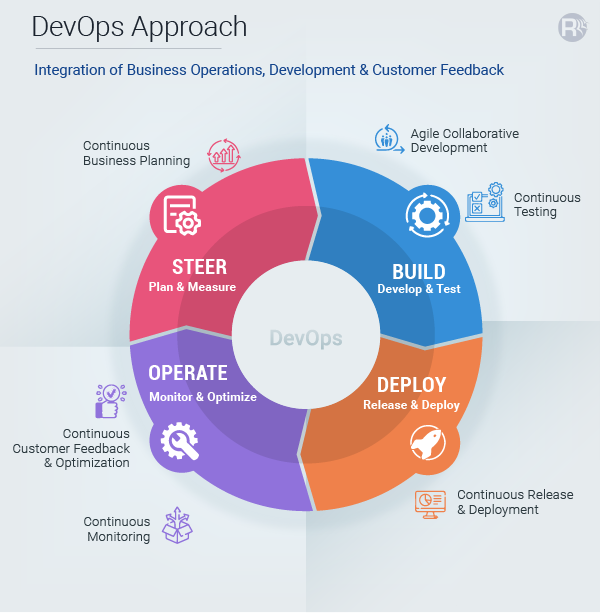
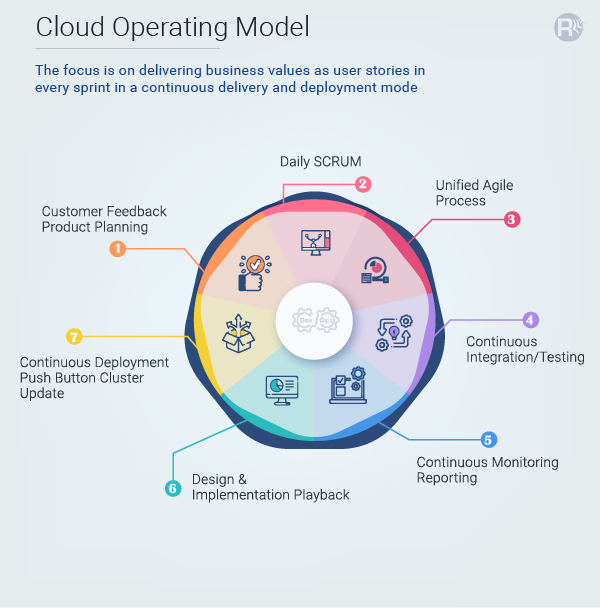
The Need for DevOps
Agile enterprise software development helps achieve faster time-to-market for internal and external-facing applications. Also, the number of stakeholders surged in business, technology, and third-party vendor ecosystems.
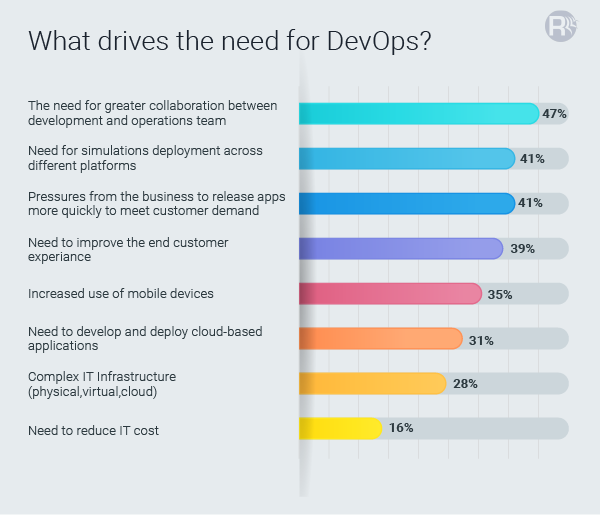
1) Rapid Software Releases
With organizations seeking to gain a competitive edge, CIOs and CTOs are under immense pressure to migrate to the cloud and release software updates more rapidly.
This need to innovate faster at times leads to an increase in costs while diminishing the quality and customer experience.
Automation through DevOps is a useful cost optimizer whether businesses need to invest money or attention in the cloud.
And, therefore associating with a cloud provider helps reduce the upfront development and ongoing maintenance costs. It also offers opportunities for DevOps teams to create effective automation strategies and their automated program tasks.
2) Cloud Migrations cast Doubt on Team Adoption and App Performance
When moving services to the cloud, 67% of CIOs believe that they will face the risks of a negative impact on app performance. Additionally, 57% of CIOs believe this move to the cloud will affect team adoption, which will affect the delivery of the desired benefits to customers.
3) IT Outages leading to Unplanned Work
IT outages triggered by external factors and performance issues caused by database changes lead to unplanned work. The sudden surge of workload or changes in workflows may cause internal delays in delivery. DevOps helps streamline processes during such uncertainties.
Understanding DevOps Business Value
To understand DevOps adoption, a survey by Rackspace.com of around 700 technology decision-makers across the US, UK, and Australia lists down some interesting findings.
- 86% of respondents were increasingly focused on implementing DevOps practices
- 51% of respondents have already implemented DevOps
- 35% of them are likely to adopt this practice shortly
The survey’s outcome confirmed the mutual belief of organizations regarding the business value of implementing DevOps practices with the following key findings:
- 52% of DevOps users confirmed an increase in customer conversion and satisfaction
- 43% of users witnessed improved customer engagement, and
- 38% experienced an increase in sales revenues
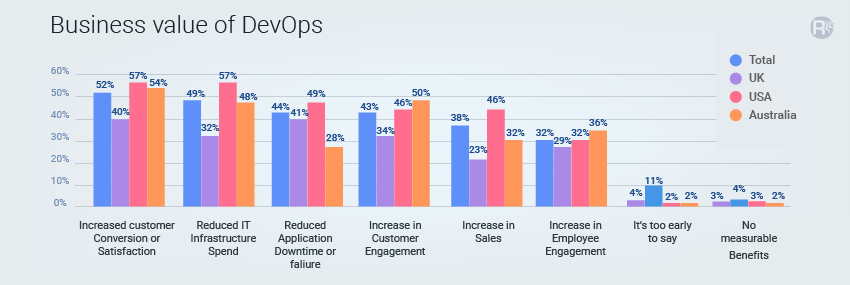
As a next-gen technology enabler, Rishabh Software plays a pivotal role in extending DevOps to meet competitive and revenue issues and establishing it as the foundation of IT operating models.
We help enterprises develop and adopt the DevOps culture by bringing together people, processes, and products to deliver quality software. It is with the end goal to provide more value to customers with a unique readiness assessment methodology and implementation strategy.

Final Word
Teams have to scale up or skill up to remain relevant and deliver results. To establish this, organizations will have to do away with legacy processes and walk the talk of a futuristic enterprise. DevOps is key to achieving this goal for the long road ahead. It is here to stay and let you ensure business continuity.
As discussed above, it has all the qualities much required to help IT businesses with not just sustaining the ongoing pandemic but even plan better for the future. However, it is vital for companies and teams to effectively use DevOps methodologies and implement best practices to explore them as never before.
At Rishabh, we help cultivate DevOps to streamline organizational culture through automation. As a natural extension for DevOps evolution, we offer CIOs and their development teams with a mix of “right” tools, practices and automation that helps secure development and operations.











 30 Min
30 Min


